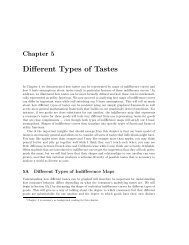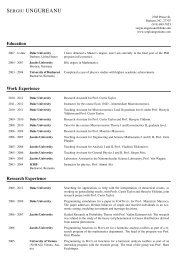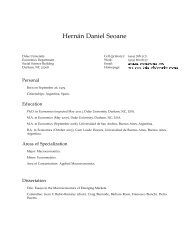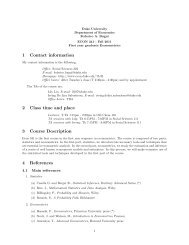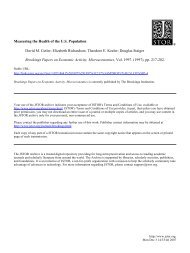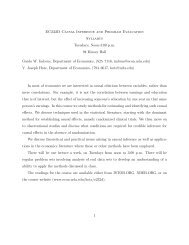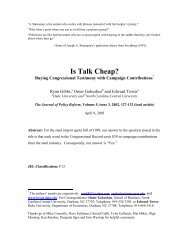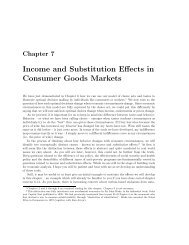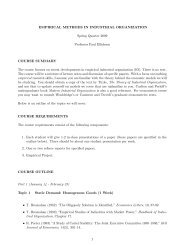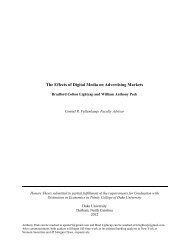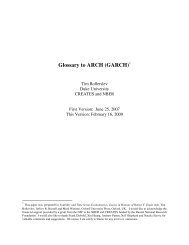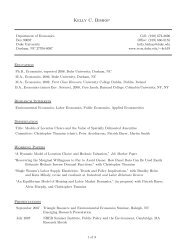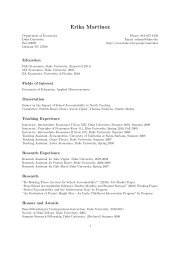E. Roy Weintraub (Duke University) - Duke University | Economics
E. Roy Weintraub (Duke University) - Duke University | Economics
E. Roy Weintraub (Duke University) - Duke University | Economics
Create successful ePaper yourself
Turn your PDF publications into a flip-book with our unique Google optimized e-Paper software.
This interview, conducted by Professor Simon Bowmaker of the Stern School of New York<br />
<strong>University</strong>, will appear as a chapter in his volume The Art and Practice of <strong>Economics</strong> Research:<br />
Lessons from Leading Minds (Northamption MA: Edward Elgar, 2012). That volume is under<br />
copyright, and it may not be reproduced except by permission.<br />
E. <strong>Roy</strong> <strong>Weintraub</strong> (<strong>Duke</strong> <strong>University</strong>)<br />
E. <strong>Roy</strong> <strong>Weintraub</strong> was born in 1943, in Brooklyn NY, and graduated with an AB in mathematics<br />
from Swarthmore College in 1964, before obtaining an MS and a PhD in applied mathematics<br />
from the <strong>University</strong> of Pennsylvania in 1968 and 1969 respectively. Professor <strong>Weintraub</strong> taught<br />
economics at Rutgers College, The State <strong>University</strong> of New Jersey between 1968 and 1970, and<br />
then moved to <strong>Duke</strong> <strong>University</strong>, where he has remained ever since, currently serving as Professor<br />
of <strong>Economics</strong>.<br />
Professor <strong>Weintraub</strong>‟s research interests are life writing and the history of economics,<br />
historiography of economics, and the history of the mathematization of economics. His mostcited<br />
articles include, „“Uncertainty” and the Keynesian Revolution,‟ History of Political<br />
Economy (1975), „The Microfoundations of Macroeconomics: A Critical Survey,‟ Journal of<br />
Economic Literature (1977), „On the Existence of a Competitive Equilibrium: 1930-1954,‟<br />
Journal of Economic Literature (1983), „Axiomatisch Mißverständnis,‟ Economic Journal<br />
(1998), and „Methodology Doesn‟t Matter, but the History of Economic Thought Might,‟<br />
Scandinavian Journal of <strong>Economics</strong> (1989). His books include, General Equilibrium Theory,<br />
Macmillan (1974), Conflict and Cooperation in <strong>Economics</strong> (Macmillan, 1975),<br />
Microfoundations: The Compatibility of Microeconomics and Macroeconomics (Cambridge<br />
<strong>University</strong> Press, 1979), Mathematics for Economists: An Integrated Approach (Cambridge<br />
<strong>University</strong> Press, 1982), General Equilibrium Analysis: Studies in Appraisal (Cambridge<br />
<strong>University</strong> Press, 1985), Stabilizing Dynamics: Constructing Economic Knowledge (Cambridge<br />
<strong>University</strong> Press, 1991), Towards a History of Game Theory (<strong>Duke</strong> <strong>University</strong> Press, 1992), The<br />
Future of the History of <strong>Economics</strong> (<strong>Duke</strong> <strong>University</strong> Press, 2002), How Mathematics Became a
Mathematical Science (<strong>Duke</strong> <strong>University</strong> Press, 2002), and Economists’ Lives: Biography and<br />
Autobiography in the History of <strong>Economics</strong> (<strong>Duke</strong> <strong>University</strong> Press, 2007), co-edited with<br />
Evelyn L. Forget.<br />
Professor <strong>Weintraub</strong>‟s academic awards include the Best Monograph Prize from the European<br />
Society for the History of Economic Thought and the Joseph J. Spengler Prize for the Best Book<br />
in the History of <strong>Economics</strong> from the History of <strong>Economics</strong> Society, which were both received<br />
in 2005. He is a former President of the History of <strong>Economics</strong> Society, and currently he is<br />
Associate Editor of the History of Political Economy and the <strong>Economics</strong> Bulletin. In 2011 he<br />
was named a Distinguished Fellow of the History of <strong>Economics</strong> Society.<br />
I interviewed <strong>Roy</strong> <strong>Weintraub</strong> in his office at the Department of <strong>Economics</strong> at <strong>Duke</strong> <strong>University</strong>.<br />
It was mid-afternoon of January 14, 2011.<br />
BACKGROUND INFORMATION<br />
You are trained as a mathematician. How did you end up as an economics professor?<br />
The short story is that when I was a second-year graduate student in mathematics, a new PhD<br />
program was created that allowed you to write a dissertation in an applied area. At the time, I<br />
was struggling to complete my preliminary examinations, and it was becoming clear that I<br />
wasn‟t going to turn into the kind of mathematician who would have a major career. And so I<br />
started talking to people around the university who were affiliated with the program. This led to<br />
a call from Larry Klein in <strong>Economics</strong>. He had heard from my father, who taught economics, that<br />
I was on the loose, and he asked me to talk to him, because he had some problems that he<br />
thought I might be interested in working on. Klein was a family friend, but of course he was also<br />
an economist of great stature, and so I decided to write my dissertation in the area of<br />
mathematical economics under his co-supervision.<br />
As a student, which professors were most inspirational or influential?
I didn‟t have any professors who were inspirational or influential. I grew up around them, and so<br />
my relationship with them was different from the norm. Being a professor was simply not a big<br />
deal. In fact, I used to joke that I was seven years old before I realized that not everybody<br />
carried the first honorific of “doctor.”<br />
Was an academic career therefore the default profession to enter into?<br />
Sure. When I was in high school, I was even typecast as a professor of geology for the play Our<br />
Town by Thornton Wilder (laughs).<br />
As a researcher, which colleagues have been most influential and inspirational?<br />
The one colleague who‟s been enormously helpful to me over the years is Neil De Marchi.<br />
We‟re very good friends – I introduced him to his future wife - and he has the kind of broad<br />
intellectual interests and engagements that I resonate with. He‟s always been the best critic of<br />
my work, and the person I give my papers to first. As for inspirational, it has to be Barbara<br />
Herrnstein Smith, of <strong>Duke</strong>‟s Program in Literature, who models for me what intellectual honesty<br />
and integrity should mean.<br />
GENERAL THOUGHTS ON RESEARCH<br />
There is an increasing emphasis in many economics departments on applied research. Is this<br />
true at <strong>Duke</strong>?<br />
Yes, over the last decade, we‟ve moved very strongly into that area, and certainly with the<br />
encouragement of almost everybody in the department.<br />
What would you say is the value of “pure” versus “applied” research in economics?
I don‟t know what that means anymore. There are many different categories of research in<br />
economics, and standards evolve over time. Someone from outside a particular research<br />
community doesn‟t really have a good idea of what constitutes good and bad work. And so you<br />
have to learn to trust, which is the basis of all scientific work.<br />
There seems to be little dialog between theory and the history of ideas in economics, though<br />
perhaps that is starting to change a bit in light of the current economic crisis. Do you think that<br />
there is now the potential for an increase in such dialog?<br />
The job of a historian of economics is to narrate the past, not to go back and find raisins in the<br />
1870s that improve today‟s pudding. I don‟t think there‟s anything in the past that will make<br />
economics better. The only thing that will make economics better is by actually producing better<br />
economics, because “better” is a word that‟s only relevant within a particular research<br />
community. They‟re the ones who judge, award credit and make those kinds of decisions. Most<br />
historians of economics disagree, and believe it can be written in the service of improving the<br />
discipline. I think that‟s nuts in the same way that an historian of physics would never think of<br />
changing the nature of physics research. But those individuals think of the history of economics<br />
from the perspective of an economist, because many of them teach introductory economics<br />
courses and socialize with those from the mainstream of the profession; they don‟t fully engage<br />
with the historians‟ community, with the history of science community, and with the science<br />
studies community. In my view, they are quite amateurish historians.<br />
How would you characterize your own research agenda and how has it changed over time?<br />
I began as a mathematician teaching mathematics to economics students at Rutgers. Next I<br />
became a mathematical economist, and then evolved into a theorist who was interested primarily<br />
in general equilibrium theory. That led to an engagement in the early-80s with the philosophy of
science literature because I wanted to understand how one appraises that kind of scientific work.<br />
During this period, I realized that nobody knew very much about the history of specific work in<br />
modern economics. And so I started to develop a history of general equilibrium theory, and I<br />
quickly became fascinated with pursuing historical research. With the help of a year spent at the<br />
National Humanities Center, where I hung out with historians, philosophers, literary scholars and<br />
the like, I began to turn myself into a historian.<br />
Do you think it is important to have broad research interests?<br />
I‟m reminded the sentence in Isaiah Berlin‟s essay, The Hedgehog and the Fox: “The fox knows<br />
many things, but the hedgehog knows one big thing.” I would say you have to find a way to be<br />
authentic in terms of your personality structure, your socialization patterns, and the work that<br />
you do; otherwise, you‟re going to run into a lot of trouble.<br />
In the end, do you think the profession has helped to bring out and shape your research for the<br />
best?<br />
I don‟t have much contact with a “profession.” I haven‟t much listened to others. I make enough<br />
money, I have fun teaching, I enjoy my colleagues, I seem to be productive, and I do work that<br />
others find engaging, which always surprises me.<br />
IDEA GENERATION<br />
Where do you get your research ideas?
From my past research. When I‟m working on a project, it‟s always the case that questions<br />
remain unanswered, and I can return to them in the future. And when I‟m completing a project, I<br />
will often have new ideas that will move my research in a different direction. I remember<br />
speaking to Joe Spengler at a Christmas party here many years ago. Joe was a former President<br />
of the AEA and, in my view, the creator of the fields of economic demography and the history of<br />
economics. He was about to leave the party early, and I asked him where he was going. He told<br />
me, “I have to deal with the page proofs for a book that I have written on Persian economic<br />
thought.” I said, “Geez, how did you ever get interested in that?” “Well,” he replied, “I was<br />
doing a book on Indian economic thought and one thing led to another…” And that‟s exactly<br />
how I work. For example, my research on the existence of competitive equilibrium led me to<br />
think about whether the work on the stability of general equilibrium was consistent and coherent.<br />
Using autobiographical accounts in some of my histories, I began thinking about the nature of<br />
autobiographical memory, and so on.<br />
At what point does an idea become a project that you devote resources to?<br />
I can‟t separate ideas and projects. I do it all simultaneously. Sometimes when a project is<br />
moving ahead, I‟ll realize that it is time to make commitments that force me to bring it to a<br />
conclusion, such as finding a book contract or a conference to give a paper, or inviting myself to<br />
Paris or London or Rome to give a seminar to my friends.<br />
IDEA EXECUTION<br />
What makes a good theoretical paper? Can you give an example?
One that I spent a lot of time trying to understand where it came from was (Kenneth) Arrow and<br />
(Gerard) Debreu‟s 1954 paper on competitive equilibrium. 1 What makes it a good paper? It<br />
depends on who is asking the question. The profession seemed to like it because it solved some<br />
problems that were longstanding and connected to important traditions. But it was also valued<br />
for particular kinds of techniques within a particular small community out of which it emerged,<br />
namely Cowles at Chicago during the 1950 to 1953 period. And so, as a historian, I think it<br />
nonsense to believe that you can provide an answer to your question that stands outside of time.<br />
The concept of a good paper is local and contingent. And it‟s the same for an empirical paper.<br />
The profession has questions that are open, and papers try to solve those problems. But are those<br />
problems the most important ones? How the hell would we know? We couldn‟t recognize that<br />
if it came up and struck us in the face. There is no view from outside the local and contingent<br />
circumstances of particular intellectual communities.<br />
Is there a particular empirical paper that you like?<br />
One that gave some drive to my own doctoral dissertation, at least in the mind of my advisor,<br />
was the Adelman-Adelman paper, which subjected the early Klein-Goldberger model to random<br />
shocks in order to see whether they could induce realistic business cycles in a macro model. 2<br />
That was an interesting paper.<br />
What advice would you give a young scholar on writing a paper relating to the history of<br />
economic thought?<br />
1 K.J. Arrow and G. Debreu (1954), ‘Existence of an equilibrium for a competitive economy,’ Econometrica, Vol.<br />
22, No.3, pp. 265-290.<br />
2 Adelman, I. and F.L. Adelman (1959), ‘The Dynamic Properties of the Klein-Goldberger Model,’<br />
Econometrica, Vol. 27, No. 4, pp. 596-625.
I don‟t use the phrase, “history of economic thought”, because it makes it seem that those<br />
thoughts are “out there” and disconnected from people. But history isn‟t “out there”; people<br />
write history. I think a history of economics paper is useful and convincing if it constructs an<br />
interesting historical argument and employs real historical evidence; in other words, research has<br />
been undertaken. I find text-based, exegetical exercises very uninteresting; for example, when<br />
someone says, “Let‟s go back and see what Adam Smith really meant in Chapter 4 of the Wealth<br />
of Nations…” A history paper is narrative; you‟re telling stories about the past. And to make<br />
your reader emphasize with the past, you have to make the stories as compelling as possible.<br />
Until about a decade or two ago, most historians of economics didn‟t do much historical research<br />
in the same sense that history departments require doctoral students to do. There were folks like<br />
Joe Dorfman and Bob Coats who of course did, but they were rather isolated. But at <strong>Duke</strong>, we<br />
now have the Economists‟ Papers Project archive, which is an immense collection of papers of<br />
distinguished economists. This includes professional correspondence, as well as the notes,<br />
drafts, and manuscripts of major works. For example, for a long time people have been writing<br />
about Paul Samuelson‟s Principles book, but it‟s been the same story over and over again,<br />
because the primary source is the text. But we now have access to the files and documents<br />
concerning the process by which Samuelson developed, wrote, and revised his book. When you<br />
use those archival materials, you get a much richer story; a sense that, “Yeah, that‟s what was<br />
really going on,” which is every historian‟s ideal: you find new materials as a result of your<br />
research that allow you to illuminate and reinterpret a story that was pretty uninteresting or very<br />
straightforward and not as complex as human experience generally is.<br />
When you hit a “brick wall” on a project, do you continue to work on the problem or do you take<br />
a break and work on something else?<br />
I do both. Generally, though, I have several large projects going on at once, and so it takes a<br />
while to disengage emotionally and intellectually from a project. You are going to experience
losses in walking away, because streams of thought will no longer be as active on your behalf.<br />
But I find I do work in curious ways. My wife will often say, “What are you doing?” I‟ll reply,<br />
“Oh…” and then she‟ll say, “You‟re working, aren‟t you?” to which I‟ll respond, “I guess I am.”<br />
And so I probably work 24 hours a day. Of course, I‟m not writing when I‟m in my sleep, but<br />
there are problems that I‟m thinking about subconsciously.<br />
I don‟t know what “taking a break” means. Just as thoughts of my wife, my children, and my<br />
grandchildren are always with me, so are the elements of my research. You can‟t just put them<br />
away. It would be like saying, “Today, I‟m not going to think about my family while I work.”<br />
(Laughs)<br />
What would you say has been the biggest change, in the course of your career, in how your<br />
research fields conduct research?<br />
I have seen the efforts that I, and a few others, have made to change the values of the history of<br />
economics community. Back in the early „80s, when I was beginning to think about the history<br />
of general equilibrium theory, Arjo Klamer was Neil De Marchi‟s and my PhD student. He<br />
wanted to write about new classical economics. I said to him, “Arjo, the people who you are<br />
writing about, like Bob Lucas and Tom Sargent , are living. Why don‟t you just go and talk with<br />
them?” Nobody had previously done such an oral history, and so we sent him off to conduct<br />
some interviews. 3 What an opportunity! But my getting impatient with Arjo came about<br />
because, in gathering the evidence for my work on the history of general equilibrium theory, I<br />
had thought to write to many of the folks who were still alive, like Arrow, Debreu, McKenzie,<br />
Koopmans, Chipman, Georgescu-Roegen, Tintner, Menger, and Simon. They were all<br />
absolutely delighted to have questions asked about their past work. I developed fairly long<br />
correspondence files with them and used those self-reports as part of my paper that got into the<br />
3 Klamer, Arjo (1984), Conversations with Economists: New Classical Economists and Opponents Speak Out on<br />
the Current Controversy in Macroeconomics, Totowa: Rowman and Littlefield.
JEL, which was different from any other paper that I had ever seen people write in history. 4 And<br />
it got me thinking that maybe I and others could do this more systematically, which led me to<br />
persuade people at <strong>Duke</strong> to construct the Economists‟ Papers Project. So I‟ve seen the history of<br />
economics move in this different direction; very different from the kind of history of economics<br />
that George Stigler thought was important. I‟m very pleased that I‟ve helped to create a major<br />
resource for historians of economics to do what I consider to be more interesting work; one that<br />
is closer to the history of contemporary science.<br />
What is your view on the increased use of mathematics in economic theory papers today?<br />
You could ask the same question in 1880, 1890, 1900, 1910…this has been going on for a long<br />
time.<br />
When I spoke with Chuck Manski, he expressed concern that young theorists today feel the need<br />
to show off their math skills, whereas he values “simple insight”?<br />
I heard exactly the same complaints on the part of faculty members at the <strong>University</strong> of<br />
Pennsylvania in <strong>Economics</strong> in the 1960s. They would say, “He came in and started proving<br />
theorems. What the hell did that have to do with economics?” As I say, this is a continuous<br />
complaint, and some of it is changing fashions, but also changing conversations within these<br />
particular communities. What the community takes as acceptable, useful, relevant and important<br />
changes over time. There isn‟t a correct way to write an economics paper, but Manksi‟s<br />
comment suggests there is. There are folks who want to make that judgment a philosophical or<br />
even a moral issue, but my argument is that it is always a historical question. How did those<br />
tastes change? What was it in the service of? What were the people thinking? What were they<br />
4 <strong>Weintraub</strong>, E.R. (1983), ‘On the Existence of a Competitive Equilibrium: 1930-1954,’ Journal of Economic<br />
Literature, Vol. 21, No. 1, pp. 1-39.
doing? How did it work? Those are the questions that interest me as a historian. Only an active<br />
scientist could ask your question; one who has no historical sensibility whatsoever.<br />
THE WRITING PROCESS<br />
Which aspect of the writing process do you find most difficult?<br />
For me, the absolutely hardest part is the first draft. If you go back to the Paris Review<br />
interviews with famous writers, one of the major questions that was almost always asked was<br />
whether they edited during writing or after they had finished. Hemingway, for instance, couldn‟t<br />
write sentence number two unless he was absolutely satisfied with sentence number one. Others<br />
just let it rip and then threw away most of it. I‟m in the latter category. But in the mid „80s, I<br />
figured out that since I talk much faster than I write, it would be best to dictate the material and<br />
send it to a typist. And so I generally dictate somewhere between five to ten pages at a shot, and<br />
there might be one useful page that makes it into the draft. The other material isn‟t wasted; it<br />
goes into an outtakes file, sits there, and I may come back to draw on it years later to work with<br />
it.<br />
I don‟t begin with an outline for the first draft, because if I did, I probably would never have<br />
found the issue interesting in the first place. I need to figure it out, which involves constructing<br />
the arguments. At the first draft stage, I have only partial, maybe mutually contradictory,<br />
arguments with weak evidence in support. At some point though that draft has enough structure<br />
that I can begin the most complex, most challenging, and most fun part of writing, cutting and<br />
editing the draft and shaping it. I can edit the draft, or a section of it, each day, put it away, and<br />
come back to it over and over to ask questions like: Why is that word there?, Does this really<br />
answer the rhetorical question asked in the previous sentence?, or „How is this argument<br />
functioning? I‟m trying to make the work speak in a convincing fashion. I love it.
What do you think of the standard of writing by economists?<br />
Oh, economists can‟t write. Almost none of them have any ear for the English language.<br />
There‟s no sense of a rhythm in their writing, and no particular style that would identify them as<br />
the author compared to someone else. There are only a few folks whose writing approaches a<br />
level of literary competence that would lead you to read them even if you weren‟t an economist.<br />
Such as whom?<br />
I think (Deirdre) McCloskey writes well even though I‟m not as intrigued by her arguments as I<br />
was in the past. Mary Morgan writes with a really authentic voice, and I have to attend very<br />
carefully to what Mary says, because she writes in a very understated fashion, but there‟s<br />
tremendous power in much of her work. (Philip) Mirowski writes in a very distinctive manner.<br />
I‟m not always happy with what I‟m reading, because it‟s too argumentative for me, but it‟s<br />
certainly well written, and there is no question of who the author is.<br />
Who proofreads your writing?<br />
I proofread it, and if De Marchi is around, I‟ll give it to him, but he‟s increasingly busy. When<br />
you write books, you must have a very good relationship with the general editor and then you<br />
need to be very accommodating and cooperative with the copy editor. I‟ve been fortunate,<br />
because the folks who I‟ve worked with at Cambridge <strong>University</strong> Press and <strong>Duke</strong> <strong>University</strong><br />
Press have been great. Currently, I‟m doing a piece that‟s going to appear in the Spring issue of
the Journal of Economic Perspectives. 5 Their editorial work on papers is much better than any<br />
I‟ve found in professional journals, because they have a different audience. The managing<br />
editor, Tim Taylor, is very, very good and helpful. Who else? I had one absolutely spectacular<br />
copy editor for a paper I did a while ago for the South Atlantic Quarterly. 6 That‟s a literary<br />
journal, but it was just wonderful to have an experience of working with someone whose<br />
language sense was so good.<br />
COLLABORATION<br />
Most of your work is sole-authored, whereas much of the work conducted by the other<br />
interviewees in this book is collaborative. What are the pros and cons of your approach?<br />
When I was Acting Dean of the Faculty here, I was problem solving all the time. I tend to have<br />
many ideas, and can produce ten different solutions to a problem very quickly. Eight of them are<br />
totally stupid, one of them is half-stupid, and the other one is worth thinking about. The function<br />
of my staff at the time was to critique my solutions. And I would say that in collaborative<br />
research, you see those two roles at work; one person produces different ideas, and the other sets<br />
out to test them. That‟s how my very early theoretical work with Daniel Graham was done; I<br />
would have ideas that he would attempt to prove and disprove, and vice versa. That was very<br />
useful. In fact, I‟m sure that none of those technical papers could have been written individually<br />
by either of us. 7<br />
5 <strong>Weintraub</strong>, E.R. (2011), ‘Lionel W. McKenzie and the Proof of the Existence of a Competitive Equilibrium,’<br />
Journal of Economic Perspectives, Vol. 25, No. 2 (Spring), pp. ??<br />
6 <strong>Weintraub</strong>, E.R. (1995), ‘Is “Is a Precursor of” a Transitive Relation?,’ South Atlantic Quarterly, Vol. 95, No. 2,<br />
pp. 571-589.<br />
7 Graham, D.H., Jacobson, E. and E.R. <strong>Weintraub</strong> (1972), ‘Transaction Costs and the Convergence of a “Trade<br />
Out of Equilibrium” Adjustment Process,’ International Economic Review, Vol. 13, No. 1, pp. 123-131.<br />
Graham, D.H. and E.R. <strong>Weintraub</strong> (1975), ‘On Convergence to Pareto Allocations,’ Review of Economic Studies,<br />
Vol. 42, No. 3, pp. 469-472.
I haven‟t done collaborative work on my historical projects, but I‟m about to co-author a book on<br />
the history of existence of general equilibrium with a young German researcher. He and I have<br />
been corresponding back and forth because he‟s unearthed, and has access to, the Debreu papers,<br />
which include lengthy interviews with members of the Debreu extended family. I‟d been<br />
planning to make my McKenzie material into a book, because I have so much of it, and I started<br />
thinking, “God, I wish I had the Debreu papers…” I wrote to him asking whether he was the<br />
least bit interested in my McKenzie material. He jumped at it! And so we are going to write the<br />
book together. It should be interesting, because it‟s my first attempt at joint work on a historical<br />
project. As you get older, sometimes you want to try something different. Can we bring this<br />
off? I don‟t know. It may just crash and burn, but at the moment it seems like fun.<br />
SEMINAR PARTICIPATION AND NETWORKING<br />
What are the benefits to attending a seminar that is closely related to your work versus one that<br />
is not closely related?<br />
There are different ways of taking in information. When I was a student, I couldn‟t both attend<br />
to what the professor was saying and take notes. It was one or the other, and I decided to screw<br />
it; I was more interested in getting a sense of what was going on and gave up on notes. My older<br />
son, who like me has some ADHD issues and specific learning disabilities, takes in information<br />
by ear; not by sight, not by reading, but if he hears it, he knows it, and he has figured out<br />
strategies over his life to get that kind of information to do it. It‟s just breathtaking to watch.<br />
And so, for him, going to a seminar would be great. For me, it is almost worthless. I can watch<br />
the performance and get a sense of the theatre, but I need to read the paper several times,<br />
otherwise I don‟t understand it.
How important is professional networking to success in research?<br />
There‟s a sense in which it‟s so important that it‟s almost not worth talking about, because<br />
professional success is success in a network. That‟s how science is done; you have to be in<br />
networks, you have to convince people, and you have to learn from others. The community is<br />
where the science is embedded; it‟s not in a paper somewhere. Who‟s your audience? Who<br />
thinks what work in this area may or may not be worthwhile? That‟s what I think of as a<br />
network.<br />
I‟ve been on many promotion and tenure committees, and ultimately the one question you‟re<br />
trying to ask is: Is this person a player? And the answer is entirely network-based. You can‟t be<br />
a hermit and be very interesting or successful at the same time. Wittgenstein may have been<br />
anti-social, but he was at the center of a large number of other philosophers and scholars at<br />
King‟s College, Cambridge for a long period of time.<br />
COMMUNICATION OF RESEARCH<br />
How do you find the right balance between communicating your research at an early stage<br />
versus the close-to-finished stage?<br />
I‟ve never much cared about holding back work. We‟ve got lots of informal ways of having<br />
internal conversations here, like lunch seminars, and I no longer feel embarrassed about going on<br />
the road with work that‟s not completely finished. I‟m interested in talking to people and having<br />
them think with me. If I get comments such as, “That doesn‟t make any sense at all”, I will deal
with it, because it doesn‟t harm me to be criticized. I don‟t go to places where I know I‟m going<br />
to have a hostile audience, but there aren‟t many such places. I‟m very easy to like (Laughs).<br />
What are the unique challenges to giving a seminar and how do you overcome them?<br />
What I generally do is talk about the context of the paper, which means historicizing it in terms<br />
of my own interests in projects, outline the major issues and questions that it opens up, and then<br />
turn the seminar into a conversation with as much of the audience as is interested. I‟m fairly<br />
gregarious, and I don‟t regard public speaking as a chore; I find it interesting.<br />
PUBLICATION<br />
How do you decide upon the appropriate journal to send your research to? Related, whom do<br />
you view as the readership of your research?<br />
I don‟t write articles with an idea for a particular journal. The project gets going, and if it‟s good<br />
enough, it‟ll find one. My paper on McKenzie started getting bigger and bigger, becoming more<br />
interesting, and opening up a number of different issues, so I decided to send a short more<br />
general interest piece of it off to the Journal of Economic Perspectives. There was a detective<br />
story involved in the research, because I uncovered a big-time surprise, namely that the referee<br />
for the McKenzie general equilibrium paper turned out to be Gerard Debreu. That came as a<br />
shock to a lot of people. The JEP hasn‟t published much in the history of economics that has<br />
been interesting historically, but I got an incredibly positive response from the editors – they said<br />
they couldn‟t put it down.
For about five years, I‟ve been working on a manuscript called, “Charismatic Scholars,<br />
Intellectual Communities, and the Allegation of Anti-Semitism,” which features case studies of<br />
Jung, De Man, Marx, Keynes, and Hayek. I have had some very positive responses from<br />
readers, but some of the different presses thought it was way too interdisciplinary. A reader who<br />
was a sociologist thought there wasn‟t enough sociology. The literary studies reader basically<br />
said, “Who the hell is this economist dragging his feet all over Paul De Man? What does he<br />
know?” Well, I know a lot more than the guy thought. Anyway at present I‟ve ended up<br />
extracting the material on Keynes and it‟s been accepted at a history of economics journal. 8 But<br />
I‟ll be back to the large project again, sometime.<br />
How would you best describe your approach to dealing with a “revise and resubmit” request<br />
from a journal? How about an outright rejection?<br />
By and large, referees are serious people who take themselves seriously, so I address carefully<br />
their comments. As you get older, you tend to insulate yourself against rejections by finding<br />
ways to anticipate that a particular journal won‟t be interested in a particular topic. And so I‟m<br />
not going to send my work to the AER.<br />
Do you think that the current structure of the publication process in economics facilitates or<br />
impedes scientific understanding and knowledge production?<br />
Journals are increasingly irrelevant for the transmission of knowledge. Work is seen, thought<br />
about, and talked about, by the established communities long before it appears in a journal.<br />
Getting it published is only serving the function of validating credit in certain ways; senior<br />
people are not publishing in journals as much as they used to – they‟re submitting their work to<br />
collections or giving it as addresses – and this is effectively leaving the publications for junior<br />
faculty in order to make reputations and gain tenure. The AEA‟s creation of a bunch of new<br />
8 <strong>Weintraub</strong>, E.R. (2012 forthcoming), ‘Keynesian Historiography and the Anti-Semitism Question,’ History of<br />
Political Economy.
journals is a reflection of the fact that there needed to be more avenues through which junior<br />
faculty members could be certified.<br />
What has been your best and worst experience during the publication process?<br />
Many years ago, I had one very bad experience with a very prestigious journal. There was<br />
simply no response whatsoever to the submission, even for a year any acknowledgement that it<br />
had been received. What I was able to put together from a couple of conversations some years<br />
later was that there was some embarrassment at the journal, and it was quite possibly associated<br />
with the paper having gone to an anti-Semitic referee in Germany.<br />
I‟ve had exceptional good fortune with several papers. Both of my papers in the Journal of<br />
Economic Literature were magnificent intellectual exchanges with the editor, Mark Perlman. I<br />
felt really, really aided and quite pleased to be part of such a co-operative process.<br />
BOOK WRITING<br />
You have written several books. Why do you write them?<br />
Because I have to! (Laughs) Don‟t scholars write books? I thought they did! (Laughs)<br />
Sometimes the story is large and complex, and that‟s what a book is.<br />
Do you enjoy writing books?
I love it. It‟s a very satisfying process because you can always be working on it. But it takes a<br />
long time to write a good book because it is very, very difficult to sustain an argument over<br />
several hundred pages. I‟ve written three really good, “mature,” single-authored books, but what<br />
I also am pleased about is that every book that I‟ve done is, in my view, better than the one<br />
before it. That‟s why I‟m apprehensive about doing the present one, because I thought my last<br />
book, How <strong>Economics</strong> Became a Mathematical Science, was terrific! I had to interweave many<br />
different stories so that they mutually supported one another. That was hard, and it took ten<br />
years to do, but it was very satisfying to bring off something as large and complex. Why do you<br />
think people write symphonies rather than works for solo piano? (Laughs)<br />
Books have long been a staple of the history of economics literature. Yet, the book publishing<br />
industry seems to be in a state of flux, and the increasing prominence of “impact factors” and<br />
the like are pushing the profession increasingly toward journal articles as the means for<br />
professional advancement. What advice would you give to a young scholar in the field about<br />
book writing versus journal article writing?<br />
For history of economics, I think you have to be doing both. In institutions and countries where<br />
there are comprehensive research assessment exercises, you have to write journal articles, and if<br />
you want to be taken seriously as a scholar of such-and-such, then you have to write a book on it.<br />
For example, probably the best scholars of Jevons are Harro Maas, Margaret Schabas, Sandra<br />
Peart, and Michael White. Michael has written many magnificent articles on Jevons, but he has<br />
not written his book on Jevons, and I hope he does it.<br />
What are your thoughts on the future of book publishing in economics?
Books have been around for a very long time, and I don‟t think they‟re going to disappear. Some<br />
arguments are long and complicated; they can‟t be tweeted (Laughs).<br />
REFEERING AND EDITING<br />
Do you have any advice for a young scholar on being a referee?<br />
No. It would only be the same kind of advice if I were asked a question like, “How can you<br />
become a better human being?”<br />
My wife is a marital therapist, and she tells me that one way to improve communication in a<br />
couple is to ask one party, before responding to statements, what the other has said, to make sure<br />
there is a baseline of respect for the other. That is helpful to think about when you are<br />
refereeing. And so I‟ve tried to keep it a practice of attempting to restate the major points and<br />
the argument of a paper in the first paragraph of my report in such a way that I can convince<br />
myself that the author would agree with me. The author is seeing that I do understand what he or<br />
she is saying, and I‟m already forcing myself to be in a position of asking how this paper can be<br />
stronger, or what are its weaknesses that either can or can‟t be repaired. That strategy removes<br />
my persona to some degree from the refereeing.<br />
TIME MANAGEMENT<br />
How do you divide up your working day, both in terms of quantity and timing of different kinds<br />
of work?
I don‟t. When I‟m walking on the indoor track, I‟m thinking about work. I can‟t<br />
compartmentalize anything.<br />
How do you balance multiple research projects?<br />
It‟s just something you do.<br />
Some of the interviewees prefer to complete one project at a time…<br />
I can‟t do that. I read five or six books at a time. Look, here are some that I cleared off my desk<br />
for you today (shows me several, weighty history of economics volumes).<br />
How about the balance between your research and non-research activities?<br />
I really like teaching. I‟m teaching small classes of juniors and seniors who are interested in the<br />
courses that I teach. I find the students utterly delightful and very smart, and I like engaging<br />
with them; it keeps me connected. If you have to convince people that what you do is interesting<br />
and enjoyable, you‟re also confirming that for yourself. And so if I can‟t do that to a class of<br />
juniors and seniors, I think I should retire, because I would no longer believe in what I‟m doing.<br />
As you get older, your energy level is lower for doing all kinds of other things, but I‟ve done<br />
everything here at <strong>Duke</strong>. I was Director of Graduate Studies for a dozen years, Chair of the
department for four years, Chair of a second department at the same time for a year, twice Chair<br />
of the Academic Council, and Acting Dean of the Faculty of Arts and Sciences for two years.<br />
I‟ve been very involved with the life of the university. These days, I‟ve withdrawn from most of<br />
it, but I‟ll probably be pulled out of retirement to sit on an august committee to give advice to an<br />
important person (Laughs).<br />
How about the balance between your professional and personal lives?<br />
Part of my marriage contract with my second wife over twenty years ago was to take seriously<br />
“wither thou goest, I will go.” And so we go to all conferences together. That‟s a balance.<br />
I was very, very active physically - playing tournament tennis and squash - but that had its own<br />
toll. I now have a badly damaged shoulder, so I just can‟t do some sports anymore. But it‟s<br />
better than being dead (Laughs).<br />
REFLECTIONS AND THE FUTURE OF ECONOMICS<br />
What have been your most important findings and contributions in your research fields during<br />
the course of your career?
I‟ve shown the history of economics community that the technical economics of the post World<br />
War II period can be historicized; one does not have to keep writing about Smith or Ricardo or<br />
Keynes or Hayek. More importantly, I‟ve both shown and argued that such historicizing should<br />
be based on both archival material and oral histories. Almost nobody was doing this before me.<br />
And so I‟ve helped to inaugurate a new era in the history of economics.<br />
My other lasting contribution is the Economists‟ Papers Project. I hope I‟m thought of like Bob<br />
Gallman who collected an enormous set of pre Civil War plantation records across the South to<br />
get a full and complete picture of southern slaveholding, and those records have been used by<br />
American economic historians ever after. Gallman is lionized. I was the initiator and internal<br />
force of the <strong>Duke</strong> archival facility, and I‟m very proud of it.<br />
What are the biggest challenges facing the history of economics?<br />
Figuring out what it‟s supposed to be doing; whether it‟s economics or it isn‟t.<br />
What are the strengths and weaknesses of your own research?<br />
Something that others, particularly Mark Blaug and Philip Mirowski, have claimed as a<br />
weakness, but I see as a strength, is that I don‟t use the history to promote one or another view of<br />
how economics might be improved. It‟s a constant criticism that I‟m too neutral; that I have no<br />
position on whether general equilibrium theory is a good or bad thing, for example. But I<br />
criticize Mirowski‟s work for being too engaged in writing history in the service of particular<br />
kinds of intellectual positions.
On the other hand, I‟ve always been pleased that people comment on how well written and how<br />
engaging my narratives are, and that the range of my scholarship is a model for how one can<br />
approach historical writing in economics.<br />
Do you have any professional regrets?<br />
I don‟t much like counterfactual history. I‟m sorry though that I‟m not going to live for another<br />
hundred years; it‟s so much fun to be doing what I‟m doing. That said, God knows what shape<br />
my body would be in by that time! (Laughs)<br />
Do you have any professional ambitions?<br />
To keep working on the kinds of projects that I‟ve developed, showing that it can be done.<br />
How would you describe the state of economics today? Are you optimistic about its future?<br />
I don‟t really consider myself an economist in the sense of being a member of the mainstream<br />
economics community anymore. Unlike many who write in the history of economics, I like<br />
economists, I respect them, and I think by and large they‟re doing very interesting work. I‟m<br />
enthralled by the work of my junior colleagues. I can‟t open issues of major journals these days<br />
without just being tremendously impressed at the topics that people are engaging and arguments<br />
that are being employed. It‟s wonderful.



